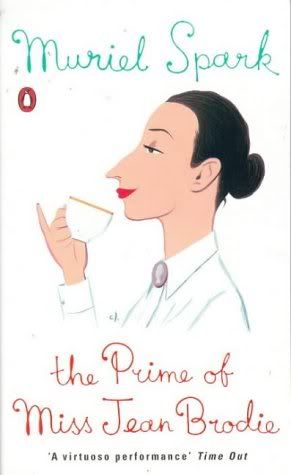Muriel Spark - The Prime of Miss Jean Brodie
I meant to read Max Beerbohm's Zuleika Dobson for my 5th book of the year, but I kept giving up. Finally I ditched it about midway through. It's not funny or cutting enough to be satire, nor is it believable enough to read as a romance. (The latter was greatly disappointing to me, because I love the romance genre and wanted to read a "classic" love story that wasn't D. H. Lawrence or Jane Austen.)
Anyway, I wasn't sure what to move on to next. I picked The Prime of Miss Jean Brodie purely because it was the thinnest and least-dense of the novels in my library stack.
It's a... a very disturbing read, on many levels. For a start, the flash forwards are very disruptive, and you can't get into the story without a sense of dread and anxiety. The story itself, when you can get into it, is pretty fucked-up. You want to admire Miss Brodie as an independent, free-thinking woman unfettered by convention, but she turns out to be a psycho spinster with no self-awareness. Which was a bit upsetting, you know: am I like that too?
I found it interesting that Muriel Spark placed Jean Brodie within a breed of woman that arose in the 1930s, the descendants of the Enlightenment and the Industrial Revolution:
the vigorous daughters of dead or enfeebled merchants, of ministers of religion, University professors, doctors, big warehouse owners of the past, or the owners of fisheries who had endowed these daughters with shrewd wits, high-coloured cheeks, constitutions like horses, logical educations, hearty spirits and private means. They could be seen leaning over the democratic counters of Edinburgh grocers' shops arguing with the Manager at three in the afternoon on every subject from the authenticity of the Scriptures to the question what the word 'guaranteed' on a jam-jar really meant. They went to lectures, tried living on honey and nuts, took lessons in German and then went walking in Germany; they bought caravans and went off with them into the hills among the lochs; they played the guitar, they supported all the new little theatre companies; they took lodgings in the slums and, distributing pots of paint, taught their neighbours the arts of simple interior decoration; they preached the inventions of Marie Stopes; they attended the meetings of the Oxford Group and put Spiritualism to their hawk-eyed test. Some assisted in the Scottish Nationalist Movement; others, like Miss Brodie, called themselves Europeans and Edinburgh a European capital, the city of Hume and Boswell.
And with the characteristic self-assurance of her milieu, Miss Brodie resisted the judgment of conventional society:
[...] these colleagues of Miss Brodie's might just as well have said 'I scorn you' instead of good morning. Miss Brodie's reply was more than ever anglicized in its accent than was its usual proud wont. 'Good mawning,' she replied, in the corridors, flattening their scorn beneath the chariot wheels of her superiority, and deviating her head towards them no more than an insulting half-inch.
But this isn't the easy confidence of men, who moved about in a world created by and for themselves. Miss Brodie's womanly self-confidence is always hard-won. Regardless of (or maybe in light of) her self-doubt, she took pains to show that she was above convention.
She was not in any doubt, she let everyone know she was in no doubt, that God was on her side whatever her course, and so she experienced no difficulty or sense of hypocrisy in worship while at the same time she went to bed with the singing master.


Comments
Post a Comment